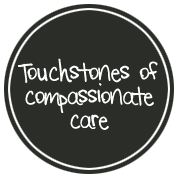Yielding (A Reminder)
(Yielding is a well written essay that hits very close to home for me. I shared this piece on my blog years ago, but it's a good read no matter now many times you read it and it's something I need to be reminded of often.)
Yielding
(from Changed by a Child)
Looking at what might
be ours if we surrender to the fact of our child’s disability and its impact on
our life, looking around at the roles others in a similar position seem to
occupy, we might immediately protest: “Hey wait a minute. I don’t want to be exceptional, special,
an advocate, political, a pioneer, a teacher, an expert on disability, brave,
anguished, stigmatized, toughened, changed, holy.”
To surrender means to
yield to the power of another; it carries strong connotations of defeat and
ignominy. But to surrender also means to give up resistance. When we cling to our self-will we are
in the ludicrous position of putting ourselves in charge of things that are out
of our control. On the other hand,
when we give up our will, when we give up resisting something we can’t change
anyway, we open ourselves to a new set of choices. Actually, we never abandon our ability to will and to
choose. We only shed the will we
are presently exerting, because it no longer fits the circumstances of our
life. Like a molting lobster, we
give up the too-small will and grow a new set of intentions that fit.
Having given up our
will that our child will walk, or see, or go to college or continue the family
name, having embraced the new choices and undertaken new actions, we may
discover that what we are doing is, in fact, exceptional or pioneering. We may find that our new, bigger shell
is that of an advocate or an expert.










2 comments:
While this is true and thus quite insightful to recognize that moment when you need to change is the whole trick. Not easy and it usually comes a bit late.Some don't struggle with the whole, my son won't do this or won't do that. Some are just stuck in the pervasive study and treatment of the human being they are whole heartedly trying to take care of, damn the consequences.
The dynamic tapestry which is our interactions with many others, others that also influence our ability and even desire to care can sometimes force you to accept things.
Whether the insight and slow change comes through will or outside influence is of great importance to the mental well being of the caregiver.
For me, change rarely comes through will. My hand is forced through outside influence - that outside influence primarily being Jack.
Post a Comment